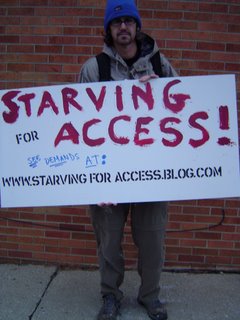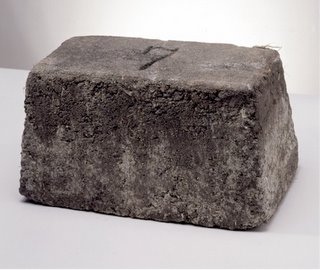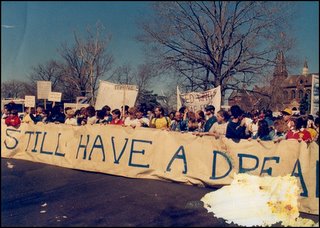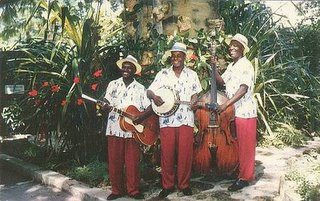 A balloon accident at the Macy's Thanksgiving Day Parade in New York City last week caused a lighting fixture to fall into the crowd, injuring 11-year-old Sarah Chamberlain (she's okay). But did you catch the disability culture angle of this story? Inclusion Daily's Dave Reynolds did. (Here's the Albany newspaper's version.) Seems the lighting fixture fell last into the lap of Sarah's sister--26-year-old Mary Chamberlain--or would have, if she didn't have her wheelchair's tray attachment in place. And a Dynavox communication device on the tray (shown at left). "We were going to leave Mary's tray in the van. But Sarah said, 'No. Mary needs to talk.'" Mary's got a unique parade story to tell now. (Macy's has agreed to pay the family's medical bills--and replace the Dynavox if it's unrepairable.)
A balloon accident at the Macy's Thanksgiving Day Parade in New York City last week caused a lighting fixture to fall into the crowd, injuring 11-year-old Sarah Chamberlain (she's okay). But did you catch the disability culture angle of this story? Inclusion Daily's Dave Reynolds did. (Here's the Albany newspaper's version.) Seems the lighting fixture fell last into the lap of Sarah's sister--26-year-old Mary Chamberlain--or would have, if she didn't have her wheelchair's tray attachment in place. And a Dynavox communication device on the tray (shown at left). "We were going to leave Mary's tray in the van. But Sarah said, 'No. Mary needs to talk.'" Mary's got a unique parade story to tell now. (Macy's has agreed to pay the family's medical bills--and replace the Dynavox if it's unrepairable.)
Cool stuff in the world of Disability Studies, Geography, and History. Based at Temple University in Philadelphia, with contributors from coast to coast. Check out our 'Notable Blogs' list below - your portal to the disability blog world.
Wednesday, November 30, 2005
Dynavox at the Parade
 A balloon accident at the Macy's Thanksgiving Day Parade in New York City last week caused a lighting fixture to fall into the crowd, injuring 11-year-old Sarah Chamberlain (she's okay). But did you catch the disability culture angle of this story? Inclusion Daily's Dave Reynolds did. (Here's the Albany newspaper's version.) Seems the lighting fixture fell last into the lap of Sarah's sister--26-year-old Mary Chamberlain--or would have, if she didn't have her wheelchair's tray attachment in place. And a Dynavox communication device on the tray (shown at left). "We were going to leave Mary's tray in the van. But Sarah said, 'No. Mary needs to talk.'" Mary's got a unique parade story to tell now. (Macy's has agreed to pay the family's medical bills--and replace the Dynavox if it's unrepairable.)
A balloon accident at the Macy's Thanksgiving Day Parade in New York City last week caused a lighting fixture to fall into the crowd, injuring 11-year-old Sarah Chamberlain (she's okay). But did you catch the disability culture angle of this story? Inclusion Daily's Dave Reynolds did. (Here's the Albany newspaper's version.) Seems the lighting fixture fell last into the lap of Sarah's sister--26-year-old Mary Chamberlain--or would have, if she didn't have her wheelchair's tray attachment in place. And a Dynavox communication device on the tray (shown at left). "We were going to leave Mary's tray in the van. But Sarah said, 'No. Mary needs to talk.'" Mary's got a unique parade story to tell now. (Macy's has agreed to pay the family's medical bills--and replace the Dynavox if it's unrepairable.)
Tuesday, November 22, 2005
Starving for Access
 A very 2005 addition to the tradition of the hunger strike--a blog with daily updates on Ryan Commerson's outdoor hunger strike (starting Monday, November 21) to improve conditions at the Michigan School for the Deaf and at the Detroit Day School for the Deaf. So far, dozens of students and supporters have joined Commerson on the sidewalk outside the MSD gym in Flint, and he's been getting some local television coverage. It's cold in Michigan in late November, so some visitors have brought coats and blankets, too.
A very 2005 addition to the tradition of the hunger strike--a blog with daily updates on Ryan Commerson's outdoor hunger strike (starting Monday, November 21) to improve conditions at the Michigan School for the Deaf and at the Detroit Day School for the Deaf. So far, dozens of students and supporters have joined Commerson on the sidewalk outside the MSD gym in Flint, and he's been getting some local television coverage. It's cold in Michigan in late November, so some visitors have brought coats and blankets, too.Says Commerson in his press release, "I have had it. I cannot tolerate the daily occurrence of language deprivation any longer."
[Hat tip to Dirksen Bauman, who posted about the Starving for Access blog on DS-Hum. I'd have put this in the monthly disability blogs roundup, but given the nature of this one, I thought it needed to go up sooner.--PLR]
UPDATE: Commerson's hunger strike has ended as of Monday 11/28. A vigil continues until promised changes begin to be realized.
Monday, November 21, 2005
Announcing new academic discussion listserv, called DS-GRAD
PLEASE FORWARD THE FOLLOWING INFORMATION
At the December 1, 2004 Graduate Student Forum at Columbia University, sponsored by the Disability Studies Network, the students in attendance expressed interest in creating a new listserv for Graduate Students in Disability Studies and using it to organize future collaborations. This listserv has now been created and is being managed by the student Scott Gordon <scott23 AT gmail.com>. It is hoped that DS-GRAD (Graduate Students in Disability Studies) will develop into a great resource - students can use it to network, consult on research projects and plan meetups in the MidAtlantic region.
The DS-GRAD discussion list is open to all current and potential graduate students interested in disability studies in the social sciences, the humanities fields and the arts. To subscribe to the list, you would need to send a message to listserv AT listserv.temple.edu and the message should say SUBSCRIBE DS-GRAD Yourfirstname Yourlastname [For example, I would send a message saying 'subscribe ds-grad mike dorn']. Online management and list archives are available here -
http://listserv.temple.edu/archives/ds-grad.html
At the December 1, 2004 Graduate Student Forum at Columbia University, sponsored by the Disability Studies Network, the students in attendance expressed interest in creating a new listserv for Graduate Students in Disability Studies and using it to organize future collaborations. This listserv has now been created and is being managed by the student Scott Gordon <scott23 AT gmail.com>. It is hoped that DS-GRAD (Graduate Students in Disability Studies) will develop into a great resource - students can use it to network, consult on research projects and plan meetups in the MidAtlantic region.
The DS-GRAD discussion list is open to all current and potential graduate students interested in disability studies in the social sciences, the humanities fields and the arts. To subscribe to the list, you would need to send a message to listserv AT listserv.temple.edu and the message should say SUBSCRIBE DS-GRAD Yourfirstname Yourlastname [For example, I would send a message saying 'subscribe ds-grad mike dorn']. Online management and list archives are available here -
http://listserv.temple.edu/archives/ds-grad.html
Tuesday, November 15, 2005
Anna Stecklin, R. I. P.

In a posting on DS-Hum tonight, Lawrence Carter-Long pointed out this story from the Poughkeepsie Journal. Bravo to the 1033 Group for replacing the numbers with names, and reminding the world that these 650 people were people.
Sadly, there are plenty more cemeteries full of numbers out there: Ingleside Cemetery in Nebraska, for example, has about 1000 pre-1956 markers, none showing names, just numbers, for former residents of the one-time "Asylum for the Chronic Insane" (now Hastings Regional Center). A Minnesota organization, "Remember with Dignity," has taken on the challenge of honoring the institutionalized dead by replacing numbered markers with names in that state. (When Minnesotan Bertha Flaten's numbered stone ["7," above] was replaced, the original marker was sent to the Smithsonian for display, along with her admission photograph.) Other states have similar projects.
I'm not the only historian of disability to start thinking of her first project while standing in a cemetery. But the cemetery I was standing in was Oakwood Cemetery in Raleigh NC, and the handsome obelisk I was looking at not only bore a man's name and dates (1806-1870), but the family's inscription, "Blessed are the Pure of Heart." Not typical for the gravestone of a 64-year-old man, but I knew a little about Thomas A. Cameron--I knew from his family letters that he was an "innocent," in the gentle language of his parents' generation. I wanted to know more.
And now, I hope someone will learn more about Anna Stecklin, and the other 649 people buried in Poughkeepsie.
Co-Editor's Note: DS-Hum is the acronym for the important and active discussion listserv called Disability Studies in the Humanities. The discussion list is open to all scholars and students interested in disability studies in the humanities fields and the arts. To subscribe to the list, you would need to send a message to LISTSERV at LISTSERV.UMD.EDU and the message should say SUBSCRIBE DS-HUM Yourfirstname Yourlastname [For example, I sent a message saying subscribe ds-hum mike dorn]. It may take a while for the list moderator to approve your subscription. Online management and list archives are available here - https://listserv.umd.edu/archives/ds-hum.html
Saturday, November 12, 2005
November 13: Edward Rushton (1756-1814)
 How can you, who have felt the oppressor's hard hand,
How can you, who have felt the oppressor's hard hand,Who for freedom, all perils would brave,
How can you enjoy peace, while one foot of your land,
Is disgraced by the toil of a slave!
Today is the birthday of English abolitionist and poet Edward Rushton, born this date in 1756 in Liverpool. He went to sea as a young apprentice. At 17, he found himself disgusted at the treatment of Africans aboard the slave ships where he worked; he was charged with mutiny for his efforts to improve that treatment. When an epidemic of eye disease spread among the captives, Rushton tried to help. But he caught the disease himself, and lost his own eyesight.
Rushton returned to England frustrated by conditions he had witnessed, and began to publish poetry on political subjects, including The Dismembered Empire (1782), The West Indian Eclogues (1787), and Will Clewline(1806). He wrote noted letters to George Washington and Thomas Paine, questioning the hypocrisy of founding a nation based on human freedoms while maintaining the institution of slavery. Rushton married and had four children. He worked as a newspaper publisher and bookseller in Liverpool, and was involved in raising funds for the founding of the Liverpool School for the Indigent Blind (1791). In 1807, Rushton's vision was somewhat restored by surgery. He died in 1814.
"Edward Rushton," based on this historical figure, is a character in the unusual soundscape experience "The Dark," which exists both online and as a touring installation. "In The Dark your eyes will be of no use to you - instead, you will need to rely on your ears and your imagination to find your way through a maze of troubled ghosts and unlock the mysteries of their lives," explain the creators, and Rushton's poems are part of the audio content of the experience.
Wednesday, November 09, 2005
Were you there?

Over at the livejournal community Quiescent Voices, deafscribe is in search of a replacement for this photograph, taken at the Deaf President Now demonstrations at Gallaudet University in 1988. He's the tall guy in the hat between the A and the D. The banner was borrowed from Howard University. The splotch in the lower right is where his cat recently, um, got sick and damaged the print. If you or someone you know has a cat-free copy of this image, contact deafscribe.
Monday, November 07, 2005
Blind Blake, Calypsonian
 For Ahistoricality, here's the Bahamian banjo player "Blind Blake" (aka Blake Alphonso Higgs, b. 1915, pictured at left with his poolside band), who led the Royal Victoria Hotel Calypso Orchestra in Nassau. According to this bio, he was not blind as a child; liner notes say he became blind in 1934, and had a guide dog called "Music" who stayed with him during performances (but I can't find the dog in any photos of Higgs). His old LPs are collector's items, but a track by Blind Blake and his Royal Victorians is included on the more recent Putumayo Calypso compilation. Higgs is often credited with writing the folk music standard "Run Come See, Jerusalem," about a disastrous hurricane that hit the Bahamas in 1929--but it's also been credited as "traditional," and he surely never got the royalties he should have. [A fine online exhibit about calypso and its history is here.]
For Ahistoricality, here's the Bahamian banjo player "Blind Blake" (aka Blake Alphonso Higgs, b. 1915, pictured at left with his poolside band), who led the Royal Victoria Hotel Calypso Orchestra in Nassau. According to this bio, he was not blind as a child; liner notes say he became blind in 1934, and had a guide dog called "Music" who stayed with him during performances (but I can't find the dog in any photos of Higgs). His old LPs are collector's items, but a track by Blind Blake and his Royal Victorians is included on the more recent Putumayo Calypso compilation. Higgs is often credited with writing the folk music standard "Run Come See, Jerusalem," about a disastrous hurricane that hit the Bahamas in 1929--but it's also been credited as "traditional," and he surely never got the royalties he should have. [A fine online exhibit about calypso and its history is here.]Turns out there was an earlier African-American ragtime guitarist called "Blind Blake" (c1893-1933; possibly named Arthur Phelps or Arthur Blake), but they were two different guys.
Saturday, November 05, 2005
Is there a geography to Disability Studies?
Thanks to Rev. Sean Parker for sharing this brilliant new Google Map application, Frappr! He uses it to track his readership. Where are you from, disability bloggers and blog readers? Simply follow the link below and stick your geographical 'pin' in the map. http://www.frappr.com/disabilitystudiesreaders
This is going to be cool ... Update: Google Maps in the funnies ...

This is going to be cool ... Update: Google Maps in the funnies ...

Thursday, November 03, 2005
Sorry, Virginia, there are no busses, trolleys or subways running anymore :-(
Philly Future is a group blog that fosters the regional community of bloggers and activists. As such, it offers a wealth of information and opinion on the ongoing SEPTA (Southeastern Pennsylvania Public Transportation Authority) strike. Still looking for decent coverage of the disability angle, however.
http://www.phillyfuture.org/taxonomy/term/29/9
Update: Governor Rendell warns that the ongoing strike jeopardizes the prospects of SEPTA getting additional money from the State of Pennsylvania to ease its chronic budget woes. From the Philadelphia Inquirer, Thursday, November 3, 2005.
Update II: The strike finally ended after one week, thankfully.
http://www.phillyfuture.org/taxonomy/term/29/9
Update: Governor Rendell warns that the ongoing strike jeopardizes the prospects of SEPTA getting additional money from the State of Pennsylvania to ease its chronic budget woes. From the Philadelphia Inquirer, Thursday, November 3, 2005.
Update II: The strike finally ended after one week, thankfully.
Tuesday, November 01, 2005
Disability Blogs Roundup, #4
I'll start the roundup this month with a welcome to some new disability-related blogs. Australian David N. Wallace has put up TWO: blob is his personal blog, and LifeKludger is specifically for posts about strategies and technologies for barrier-busting. Samples: the former has a nice post on the concept of disintermediation as it relates to the history of disability rights; the latter has a recent post about the kinds of specialized robot arms Wallace would like to see developed.
Adaptive technology is also on the mind of the Angry Gimp: "People, quit telling me I'll walk again" is her plea to well-meaning folks who shower her with reassurances about medical advances that will cure her someday. "If people really want to help me out, really want to make me feel better, they'll tell me that there are people doing research to create adaptive equipment to make my life easier. They'll tell me that they are working for political causes that will give me the funding I need to survive." And speaking of making life easier (and surviving, too), David Faucheux suggests there might be a market for a "best cities" list for blind people, a list of places with audible traffic signals and well-maintained sidewalks, where the medical professionals and transit workers are enlightened.
Michael Bérubé has A Stupid Proposal: how about we retire the diagnostic insults ("idiot/moron/imbecile") already? Language, as always, matters. Edge-Centric and Ouch! have recent entries on the Spazz wheelchair--yeah, it's a real product name. The marketers claim it means "wild and crazy" in California, where the the company's based--but I'm here in California, right at the beach, and I say we have plenty of better words for them to try instead. At Along the Spectrum, Shawn has a terrific rant on autism terminology.
The mainstream press doesn't regularly cover the disability angle on current events, but blogs do: Edge-Centric is your go-to blog for perspectives on the Alito nomination, the Wal-Mart memo, and the passing of Rosa Parks, as well as ongoing coverage of Gonzales v. Oregon (the physician-assisted suicide case that the Supreme Court will decide this term). Ouch!, meanwhile, has also had an entry on Wal-Mart, and commentary on Canada's recent immigration ruling about families and disabled children. And history blogger Ralph Luker at Cliopatria briefly noted Freedom Ride '05, in which disability rights advocates are touring Illinois to protest continuing institutionalization in nursing homes and other group facilities. Haven't found any blogging on the plight of disabled survivors of the earthquake in Pakistan and India, but Chapati Mystery has been tracking relief operations, and there are news items here and here on the subject, for starters.
What are folks reading? Books are Pretty says the French graphic novel Epileptic is both "incredibly ambitious" and (at 361 pages) "exhausting." Jamie Bérubé and his dad are discussing Harry Potter and the Half-Blood Prince; Kestrell's reading Harry Potter fanfic with disability themes, and plenty of other stuff, too.
And finally, it's that time of year: Angry Gimp (who lives in Minnesota) wasn't so angry to find some wheelchair-friendly winter gear that's actually comfortable and warm; Katja at Broken Clay also blogged about the perils of winter weather, or not (she's in Colorado).
Whew! Okay, next round-up should go up sometime in early December. Tips are always welcome.
Adaptive technology is also on the mind of the Angry Gimp: "People, quit telling me I'll walk again" is her plea to well-meaning folks who shower her with reassurances about medical advances that will cure her someday. "If people really want to help me out, really want to make me feel better, they'll tell me that there are people doing research to create adaptive equipment to make my life easier. They'll tell me that they are working for political causes that will give me the funding I need to survive." And speaking of making life easier (and surviving, too), David Faucheux suggests there might be a market for a "best cities" list for blind people, a list of places with audible traffic signals and well-maintained sidewalks, where the medical professionals and transit workers are enlightened.
Michael Bérubé has A Stupid Proposal: how about we retire the diagnostic insults ("idiot/moron/imbecile") already? Language, as always, matters. Edge-Centric and Ouch! have recent entries on the Spazz wheelchair--yeah, it's a real product name. The marketers claim it means "wild and crazy" in California, where the the company's based--but I'm here in California, right at the beach, and I say we have plenty of better words for them to try instead. At Along the Spectrum, Shawn has a terrific rant on autism terminology.
The mainstream press doesn't regularly cover the disability angle on current events, but blogs do: Edge-Centric is your go-to blog for perspectives on the Alito nomination, the Wal-Mart memo, and the passing of Rosa Parks, as well as ongoing coverage of Gonzales v. Oregon (the physician-assisted suicide case that the Supreme Court will decide this term). Ouch!, meanwhile, has also had an entry on Wal-Mart, and commentary on Canada's recent immigration ruling about families and disabled children. And history blogger Ralph Luker at Cliopatria briefly noted Freedom Ride '05, in which disability rights advocates are touring Illinois to protest continuing institutionalization in nursing homes and other group facilities. Haven't found any blogging on the plight of disabled survivors of the earthquake in Pakistan and India, but Chapati Mystery has been tracking relief operations, and there are news items here and here on the subject, for starters.
What are folks reading? Books are Pretty says the French graphic novel Epileptic is both "incredibly ambitious" and (at 361 pages) "exhausting." Jamie Bérubé and his dad are discussing Harry Potter and the Half-Blood Prince; Kestrell's reading Harry Potter fanfic with disability themes, and plenty of other stuff, too.
And finally, it's that time of year: Angry Gimp (who lives in Minnesota) wasn't so angry to find some wheelchair-friendly winter gear that's actually comfortable and warm; Katja at Broken Clay also blogged about the perils of winter weather, or not (she's in Colorado).
Whew! Okay, next round-up should go up sometime in early December. Tips are always welcome.